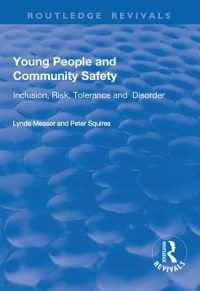- ホーム
- > 洋書
- > 英文書
- > Politics / International Relations
Full Description
This is a thought-provoking analysis on why democracy succeeds in some countries but not others, comparing the post-transition experiences of two cases of contemporary democratisation: Russia and Indonesia. Following authoritarian regimes, democracy eroded in Russia but flourished in Indonesia - so confounding dominant theories of democratisation that predicted the opposite outcomes based on their levels of socioeconomic development and histories of statehood. Identifying key behaviours and patterns of political participation as a factor, Lussier interweaves ethnographic interview and quantitative public opinion data to expand our understanding on how mass political participation contributes to a democracy's survival. The integration of both micro- and macro-level data in a single study is one of this project's most significant contributions, and will enhance its appeal to both researchers and instructors.
Contents
1. Introduction: activating democracy; 2. Extending democratization theory: the cases of Russia and Indonesia; 3. Elite-constraining participation and democracy's survival; 4. Testing the model: predicting non-voting political participation; 5. Tocqueville revisited: civic skills and social networks; 6. Political efficacy and 'throwing the rascals out'; 7. Political trust and regime legitimacy; 8. Conclusion: political participation and the future of democracy.








